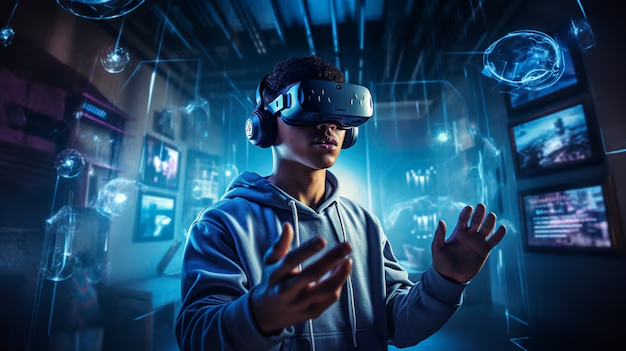Gaming has come a long way from its humble beginnings as simple pixelated entertainment to becoming one of the largest industries in the world. With technological advancements constantly reshaping how games are developed, played, and experienced, the future of gaming is full of exciting possibilities. From virtual reality (VR) and augmented reality (AR) to artificial intelligence (AI) and cloud gaming, the gaming industry is primed for an exciting transformation. In this article, we will explore the key trends and innovations that will shape the future of gaming in the coming years.
1. Virtual Reality (VR) and Augmented Reality (AR)
Virtual reality and augmented reality are two technologies that have already begun to change the way we experience video games. VR allows players to immerse themselves completely in a digital world, while AR blends virtual elements into the real world. As the technology continues to evolve, we can expect VR and AR gaming to become even more immersive and interactive.
In the future, VR and AR will not just be limited to gaming but will extend into entertainment, education, and even healthcare. The development of more powerful, affordable headsets and controllers will allow players to experience hyper-realistic environments, offering deeper immersion in their favorite titles. Upcoming VR titles are expected to showcase breathtaking worlds, while AR games may continue to transform how we interact with our surroundings.
2. Cloud Gaming
Cloud gaming is revolutionizing the way games are played. Instead of relying on powerful hardware, cloud gaming allows players to stream games directly from the cloud to their devices, similar to how streaming services like Netflix work. This eliminates the need for expensive gaming PCs or consoles, as long as players have a stable internet connection.
In the future, cloud gaming platforms like Google Stadia, NVIDIA GeForce Now, and Xbox Cloud Gaming (formerly Project xCloud) will become more robust, offering access to a larger library of games with lower latency and higher resolutions. With the increasing availability of high-speed internet worldwide, cloud gaming will make it possible to play high-end games on any device, anywhere, making gaming more accessible than ever before.
3. Artificial Intelligence (AI) and Procedural Generation
Artificial intelligence and procedural generation are transforming game development by allowing games to create dynamic and ever-changing experiences. AI can adapt to player behavior, ensuring that each session feels unique, while procedural generation enables developers to create vast, expansive worlds without the need for handcrafting every environment.
In the future, AI-driven NPCs (non-playable characters) will be more intelligent, responsive, and capable of creating emotionally engaging interactions. Additionally, procedural generation will enable the creation of infinite worlds with endless exploration, ensuring that players always have new content to discover. These technologies will also enhance game development by speeding up the design process and reducing costs.
4. Next-Gen Consoles and Hardware Advancements
The release of the PlayStation 5 and Xbox Series X/S has ushered in a new generation of gaming consoles that boast impressive performance and graphical capabilities. These consoles are equipped with faster SSDs, improved GPUs, and more powerful processors, which enhance load times and graphics quality. But the future of gaming hardware goes beyond these improvements.
In the years to come, we can expect further advancements in gaming consoles, such as ultra-fast load times, better ray tracing, and more powerful processing capabilities. Additionally, new hardware innovations like specialized controllers, VR headsets, and haptic feedback systems will provide more immersive gaming experiences. The integration of AI into consoles will also allow for smarter game experiences, tailoring content to each player’s preferences.
5. Metaverse and Social Gaming
The concept of the Metaverse is quickly gaining traction as the next big thing in gaming and digital interaction. In essence, the Metaverse is a shared virtual universe where players can socialize, play games, create content, and interact in a persistent online environment. Companies like Facebook (Meta) and Epic Games are investing heavily in creating Metaverse-like experiences, which will redefine how we engage with digital worlds.
In the coming years, the Metaverse will likely evolve into a more immersive and interconnected space where gaming, socializing, and even commerce can take place in a seamless, digital ecosystem. Players will be able to own virtual assets, create their own worlds, and socialize with others across various platforms. This shift will significantly impact how we perceive gaming as both a pastime and a platform for creativity and interaction.
6. Blockchain and NFTs in Gaming
Blockchain technology and non-fungible tokens (NFTs) are making waves in the gaming world by providing players with the ability to own, trade, and sell in-game assets in a secure and transparent manner. NFTs, which are unique digital assets stored on a blockchain, enable players to have true ownership of virtual items like skins, weapons, and even land in virtual worlds.
As blockchain technology continues to mature, its integration into gaming will likely grow, allowing for more decentralized gaming economies. Players will be able to earn digital assets that have real-world value, and these assets can be traded across games and platforms. Blockchain-based gaming is also expected to offer better security, preventing fraud and enhancing player trust in virtual economies.
7. Improved Storytelling and Player Choice
Storytelling has always been at the core of many successful games, but in the future, it will be more immersive and interactive than ever. Advances in AI, motion capture, and voice acting will allow for more realistic and emotionally charged narratives. Additionally, player choice will continue to play a key role in shaping game narratives.
The future will bring games where players can have even more influence over the direction of the story, with branching narratives and consequences that feel more impactful. Games like The Witcher 3 and Cyberpunk 2077 have already demonstrated how player choices can affect the world around them, and future titles will only expand on this concept.
FAQs
- What is cloud gaming? Cloud gaming allows players to stream games directly from the cloud to their devices, eliminating the need for powerful gaming hardware.
- How will VR and AR change the future of gaming? VR and AR will create more immersive and interactive gaming experiences, with VR offering full immersion in digital worlds and AR integrating virtual elements into the real world.
- What is the Metaverse? The Metaverse is a shared virtual universe where players can interact, socialize, and engage in digital activities in a persistent online environment.
- Will AI make games smarter? Yes, AI will allow for more intelligent NPCs and dynamic, ever-changing game experiences based on player behavior.
- What is blockchain gaming? Blockchain gaming allows players to truly own digital assets like in-game items, using NFTs and blockchain technology to create secure, transparent digital economies.
- How will next-gen consoles evolve? Next-gen consoles will see improvements in processing power, graphics, and immersive technologies like VR and haptic feedback.
- Can we expect better storytelling in future games? Yes, future games will feature more emotionally engaging and interactive storytelling, with player choices influencing the direction of the narrative.
Conclusion
The future of gaming is incredibly exciting, with advancements in VR, AR, cloud gaming, and AI transforming how we play, interact, and experience virtual worlds. From the rise of the Metaverse to the integration of blockchain and NFTs, the gaming industry is set to expand into new frontiers, offering players innovative and immersive experiences. As technology continues to evolve, the gaming world will become a more interconnected, dynamic, and creative space, making the possibilities nearly endless.
Key Takeaways:
- Virtual reality (VR) and augmented reality (AR) will redefine gaming by offering more immersive and interactive experiences.
- Cloud gaming will make high-end gaming more accessible by eliminating the need for expensive hardware.
- AI and procedural generation will make games more dynamic and tailored to player behavior.
- The Metaverse will become a central hub for gaming, socializing, and content creation.
- Blockchain technology and NFTs will offer true ownership of in-game assets, creating secure, decentralized gaming economies.

